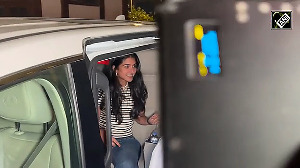A little past the now-celebrated automobile belt of Gujarat's Sanand, close to Ahmedabad, stands an inconspicuous 20-year-old manufacturing plant, surrounded by some 65 acres of lush grounds.
When set up in 1993 by the Ranka family's Modern Group, this was the first terry towel manufacturing unit in the whole of Asia, to be followed by Welspun and Trident.
Today, Modern Terry Towels Ltd is among the clutch of Indian companies which have, without much pomp, thrived on the growth of the subcontinent as a sourcing destination for global retailers -- the combined purchases by Walmart, Tesco, IKEA and Carrefour is estimated to be $3.5-4 billion yearly -- and now find themselves in a position of advantage, as other major procurement regions, particularly China, face cost pressures and labour disturbances.
"Terry is a three- dimensional fabric where while two yarns criss-cross, the third yarn is looped over them to give a softer feel," says Sanjay Baijal, president of the Rs 100-crore (Rs 1-billion) towel maker.
It exports the majority of its production, mainly across Europe and America, with some part going to West Asia, too.
The terry towel technology the plant continues to use was brought to India by the Modern Group, in collaboration with Courtaulds, the now-defunct British chemicals and textile major, also the erstwhile owners of Christy, the luxury towel brand acquired by Welspun in 2006.
What began as regular supply to international retail brands such as Christy got extended to other big retail names, including America's Walmart and European retailers such as IKEA and Tesco in the early to mid-2000s.
Walmart, for instance, was buying 40-60 tonnes per month of the plant's total monthly production of 400 tonnes at one point.
MTTL also happens to be one of the few global suppliers of the 100cm-wide beach towels and 40cm sports towel, entirely exported to the European and US markets.
To do that, the plant houses a dozen Jacquard looms and 48 Dobby looms that churn out 40 tonnes and 300 tonnes of towels per month, respectively.
Yet, Baijal isn't obsessed with only servicing the heaviest of hitters in the retail space.
"We don't have to necessarily run behind the big boys. We try to fit in ourselves wherever we get an opportunity.
Bigger terry towel suppliers need bigger orders to survive, while we can be content supplying to retailers like the US' Target Group.
Plus, the 500-store buyer has the same quality requirements as Walmart, which can be met easily," he says.
Margin maketh the manufacturer
For Kamal Ranka, member of the promoter family at the Modern Group, this business is essentially a big balancing act.
"If we want, we can produce 100 per cent for companies
"It is a question of balancing margin and capacity," he says.
Of the 5,000-tonne per annum capacity of MTTL, about 15 per cent usually goes to Walmart, putting it right behind the likes of Welspun.
The difficulty in managing margins has played a substantial part in keeping many players away from servicing international retailers.
Domestic footwear manufacturer Woodland, as well as the iconic dairy brand, Amul, claim discomfort with razor-thin margins was part of the reason they chose to stay away from the great sourcing game.
The other problem is scale, says Pinakiranjan Mishra, partner and national leader for retail and consumer products at Ernst & Young, a factor that could blunt the emergence of India as a top low-cost sourcing destination.
"Some Indian companies have faced challenges in providing the required economies of scale to its global customers.
"With global retailers concentrating their sourcing from select emerging markets that provide volumes, quality and a cost advantage, India may need to make policy and structural changes to be ahead of competition," he explains.
Optimism
Not only is economic slowdown in major markets creating increasing pressure on large, multinationals to source from low-cost markets.
"Retailers also believe they need to spread their sourcing base to reduce risks, which could be political, social or natural calamities," adds Mishra.
"We expect their sourcing of Indian general merchandise could increase in the near to medium term."
This optimism continues to drive people like Adarsh Gupta, who led shoemaker Liberty's branching into the whiteware business in 2005.
"We were looking for diversification options and found high-quality ceramic sanitary ware to be an attractive segment," says Gupta, who is CEO of Liberty Whiteware and an executive director at the group flagship, Liberty Shoes. Liberty Whiteware is now understood to have become a sourcing partner for Scandinavian home products major IKEA, which sources close to $1 billion worth of products from India. Although Gupta declined to comment on the partnership, he admitted much of the 30 per cent year-on-year growth the company had seen in recent years was led by exports.
"For the last three-four years, we have been focusing on exports and now about 90 per cent of our production is shipped overseas," he adds.
But the sustained rise in gas prices over last year is forcing him to take a hard look at the math behind his business. Despite this, Gupta remains unequivocally bullish about grabbing a piece of the sourcing pie.
Propelled by ambition, the Indian sourcing bandwagon is unlikely, in sum, to slow down any time soon.
Photograph courtesy: Modern Terry Towels Ltd website







 © 2025
© 2025